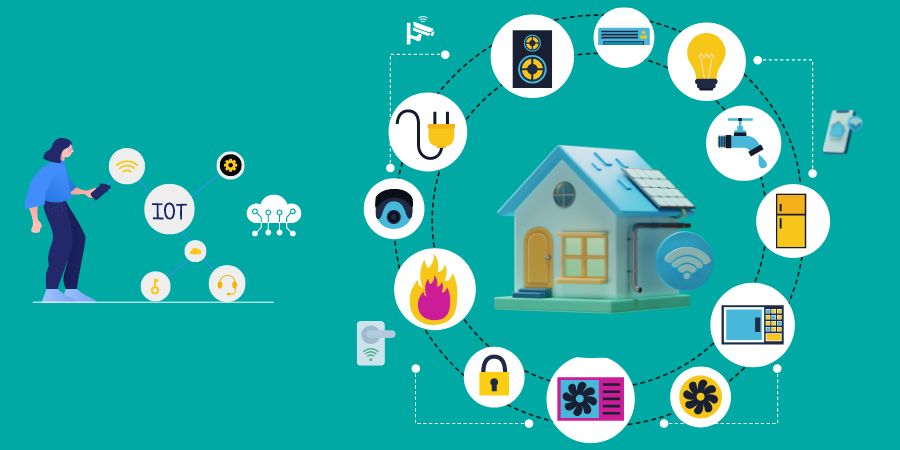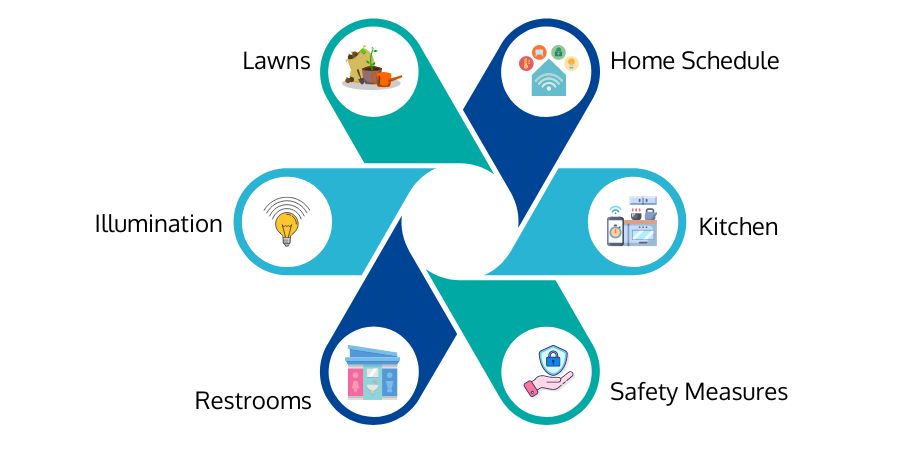
The term "home automation" describes the automation of a home, also referred to as a "smart home" or "smart house." Home automation with the Internet of Things (IoT) is the ability to control domestic appliances with internet-connected hardware. It can entail preprogramming complex heating and illumination systems, sirens, and residential security protocols linked through a central hub and accessed remotely via a mobile application. The IoT home automation system lets you control devices such as light sources, ventilation, and computers. It will also have home security elements, including alarm systems and access control. Once linked to the network, household appliances become a crucial part of the Internet of Things.
A home automation system may track or regulate devices, lighting, temperature, sound systems, and other factors like the times we wake up, eat and go to bed, as well as our tastes in music, which are all known to smart IoT devices. We can all benefit from smoother lives because a smartphone app easily controls our home security systems, and we don't have to worry about them when we are away from the sweetest and most comfortable place in the world, our home.
Due to a variety of less expensive smart home technologies, smart homes are becoming a more affordable solution for clients. It enables users to turn on and off appliances, regulate the temperature in their homes, and even generate grocery lists. Moreover, the kitchen computer, which was developed in the late 1960s and had recipe development capabilities, never became a smash hit because of its high cost.
We'll look at how IoT technology is most frequently used in smart homes. A central online hub manages every single device in an IoT smart home. Then a smartphone app is used to manage the primary smart home hub.

Incorporating IoT into Smart Homes
1. Lawns
Sensors could be highly beneficial for those wanting to grow vegetables, fruit, and spices at home. The heat, the plant's moisture level, and the amount of sunlight can all be checked using the app. The program can monitor the current conditions of the soil, assess if it has enough hydration, and turn on a smart watering system. Water wastage is avoided when the irrigation system is turned off, and the water content reaches the desired level.
2. Illumination
The lights in your home can be controlled by your mobile, laptop, and other connected devices. The system can automatically turn down the lighting when you leave the residence to conserve energy. You might not even need to press a button for the lights to turn on when you enter your home. Also, a person's needs can be met by automatically adjusting the lighting in their home. For example, the lights might be programmed to dim automatically as soon as someone starts watching a movie to prevent them from getting diverted.
3. Restrooms
Bathroom routines could be more fun, quicker, and more enjoyable due to IoT technology. Smart mirrors that can be connected to other devices like computers and smartphones recognise the profiles of family members and display relevant information to those people, such as news stories, forecasting, or certain habitual sites.Specialised sensors can detect motion and turn the water off when nobody is using the restroom. To conserve water, smart shower controls may also identify individuals and set the optimum water pressure and temperature for them. They may also place a time limit on how many minutes a person can take a shower.
4. Safety Measures
When you leave your home, do you regularly make sure your TV, computer, and other electronic items are already off and that the windows and doors are closed? Smart security systems can perform this task on your behalf with the help of particular sensors. The app enables users to monitor and control the temperature, moisture, and brightness. These sensors ensure that your residence is secure from human and animal invaders. Additionally, you can watch after your senior family members and offer assistance as needed.
5. Kitchen
Through AI technology, IoT appliances can make cooking faster and simpler. Certain built-in programs record whether the person has enough food stored in the refrigerator, provide recipe recommendations, and evaluate the nutritional value of meals. To ensure it's all operating correctly, smart sensors can keep an eye out for fire, unburned hydrocarbons, and the moisture and heat levels in your kitchen.
6. Home Schedule
IoT technologies can regulate your apartment's warmth, interior setup, and surveillance system. It can also deliver you the latest news, search data on the web, and notify you via an online media app about transactions you need to make.
Your home's automation system's status may also be checked anywhere. Since your lighting, safety, and other internet-connected devices are synchronised, you can use the app to check on them while you're visiting your friends or family.

 Batoi Corporate Office
Batoi Corporate Office